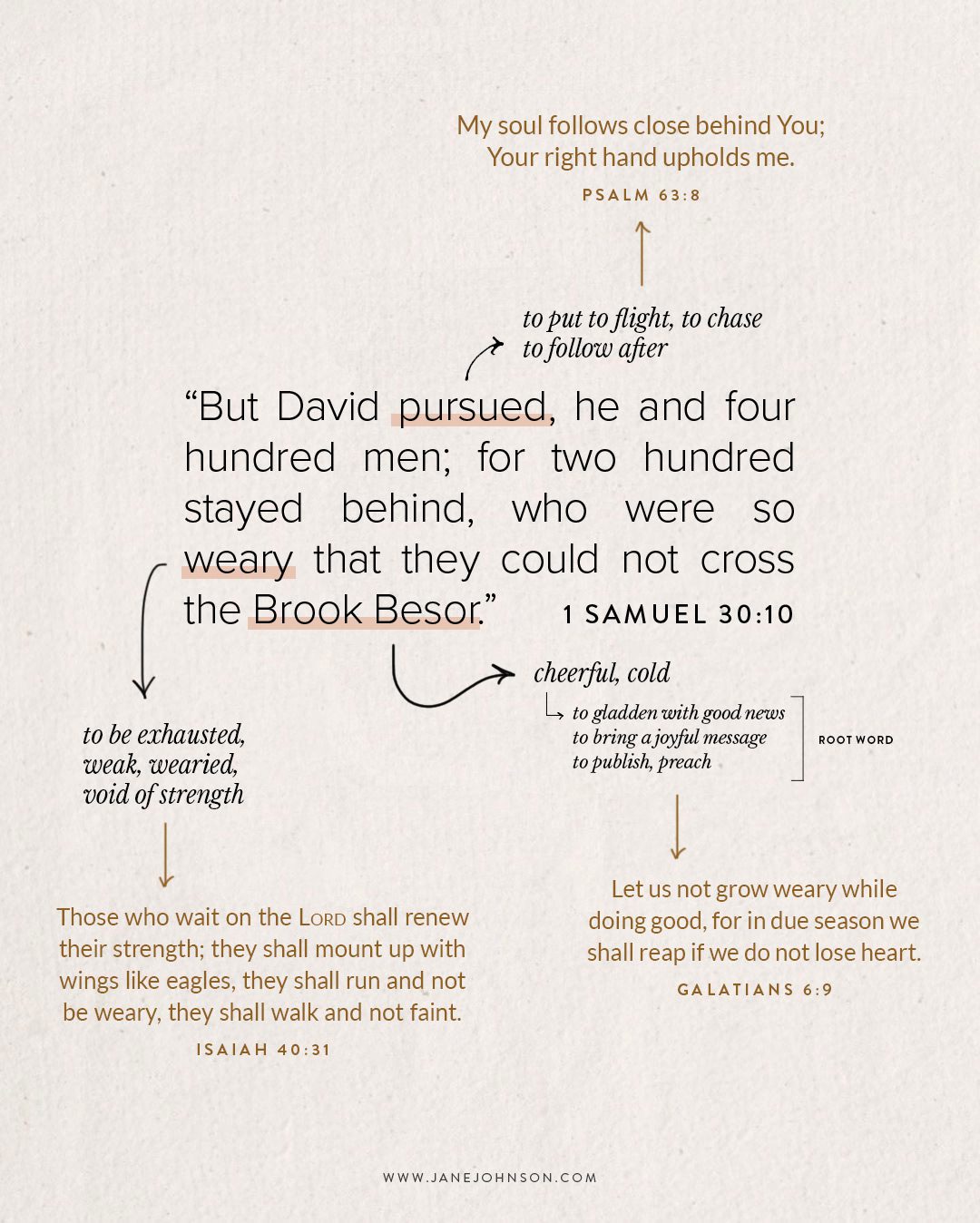Listen, I know I’m doing things a little bit differently – that there are established rules and boundaries for studying Scripture. Those things are put into place to protect you, the integrity of your study, and the soundness of your conclusions. But I think that we sometimes rush through to the safe answer, the provided-for-you one. The kind of insight into a passage that you remember from that sermon because it rocked you to your core, and you haven’t thought to look at it again, turn it on its side, examine it from another angle, and maybe in some different light.
Yes, there are universally understood interpretations for passages, and they are universally understood and accepted because they are accurate. But what about the sub-lessons that are tucked away? Like, for example, 1 Samuel 30. There was a group of 200 men who were genuinely and understandably exhausted. They were soldiers who had been fighting long and hard until, in verse 10, they had no fight left (many also actively grieving from the kind of insurmountable loss that comes with war).
They had every reason to stay behind. To bow this one out. To sit by the brook for a while and let the rest of the troop keep on with the pursuit. They even shared the spoil when the army returned victorious at David’s insistence. If there was no shame from the king, then no shame was to be had. The main point, the one that’s emphasized in all of the commentaries? It’s that: stay or go? You still get the plunder. It’s a valiant point and one that gives permission to rest when you absolutely need to rest. But I’m afraid that, in the perfect storm of tiring circumstances meets Bible story, it can give you an excuse to stop fighting when you just need to keep going.
I was in that kind of circumstance as I wrestled with the words late last summer. I wanted an excuse to stop pursuing my calling just because the hustle was wearing me down. So, I looked deeper, dug into the definitions of the words that made the story, and I saw that the brook those men were too exhausted to cross – Brook Besor? It means cold, yes, but it also means cheerful. And if you peel it back one more layer and look at the root, you’ll see: it also means to gladden with good news.

The point is: there is a subtle urge to keep going tucked into the language of the text here – one you’d easily pass right on by if you aren’t slowing down and stopping to take a good look around. I’ve lived the last two decades of my life in the Scripture subtleties, desperately looking for the less-obvious, tucked-away exhortations to keep going, keep hanging on, keep pushing through when all I wanted to do was quit.
And the main emphasis of this story in 1 Samuel 30? It’s that those 200 men who stayed behind because they were bone-tired weary still shared in the plunder that the other soldiers brought back from battle at the urgency and order of the king. But there is also this secondary, subtle lesson of being joyful or cheerful in giving and receiving good tidings – even if the water is so absurdly cold that your good-news feet are numb and you can hardly move another step.
Yes, there are times when God absolutely wants you to stay home and rest. And there are other times when He undoubtedly wants you to keep moving and pressing forward, running in His strength made perfect in your weakness. And then there are the times where He will leave the choice up to you, blessing you either way.
Sometimes discerning which one you’re staring down means digging into the subtleties of a passage and allowing the Spirit of God to speak directly into your right-then. Because, that morning last summer, when I started digging? I wanted to rest from exhaustion too. Instead, I uncovered a surprise exhortation in the form of one single word that was carried on the breath of His unmistakable Spirit-whisper: Don’t.


